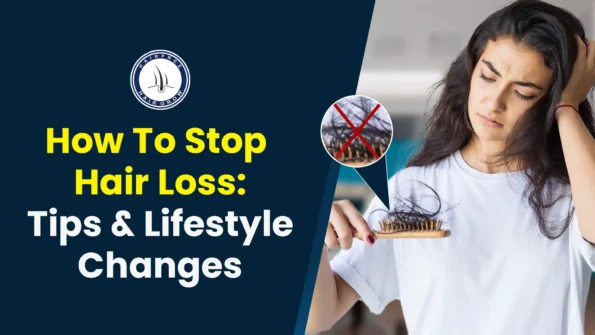Are you worried about hair fall? Wondering if there’s anything you can do to prevent it or at least slow it down? Even if you have a genetic tendency towards baldness, there are some lifestyle changes you can make to potentially delay its onset. Let’s dive into some common causes of hair fall and what you can do about them. Understanding how to stop hair loss involves recognizing the factors that contribute to it.
Understanding the Causes of Hair Fall
To effectively address hair fall, it’s crucial to understand its causes. One of the primary reasons for hair loss is the health of your scalp and hair. Conditions like dandruff, which can be caused by an oily scalp, the use of certain hair products, or even hard water, are common culprits. If you suffer from dandruff, it’s essential to consult a dermatologist who can recommend an effective anti-dandruff shampoo or other treatments.
1. Scalp Health Issues
Many patients these days struggle with dandruff. This can be due to:
- An oily scalp and face
- The hair products you use
- Hard water
If you’re dealing with dandruff, it’s best to consult a dermatologist. They can prescribe an effective anti-dandruff shampoo or other treatments if needed.
2. Smoking and Tobacco Use
Believe it or not, smoking and chewing tobacco can significantly impact your hair health. These habits affect blood circulation to your scalp, potentially accelerating baldness. The good news? This is an easily changeable factor. Quitting smoking and tobacco use can make a big difference in reducing hair fall.
3. Diet and Nutrition
Your diet plays a crucial role in hair health. After all, hair is primarily made of protein. Here’s what you should include in your diet:
- Protein-rich foods
- Foods high in omega-3 and omega-6 fatty acids (like pumpkin seeds, sunflower seeds, and flax seeds)
- Milk and milk products (good source of Vitamin D)
- Foods rich in Vitamin B12
A balanced diet that’s good for your body is good for your hair too!
4. Stress and Sleep Patterns
In today’s fast-paced world, stress levels are on the rise. Add to that late sleeping patterns and increased screen time, and you’ve got a recipe for hair fall. Mental stress can significantly increase hair loss.
What Can You Do to Reduce Hair Fall?
Now that we have identified several common causes of hair fall, it’s important to take proactive steps to address these issues. Here are some effective measures you can implement to help reduce hair loss and promote healthier hair growth:
Treat Scalp Issues
If you are experiencing dandruff or any other scalp conditions, it is crucial to seek treatment from a qualified dermatologist. They can provide you with the appropriate solutions to address these problems effectively.
Quit Smoking and Tobacco
Giving up smoking and any form of tobacco can significantly enhance blood circulation to your scalp. Improved circulation means that your hair follicles receive more nutrients and oxygen, which can help in reducing hair fall.
Improve your Diet
Focus on enhancing your diet by incorporating a variety of protein-rich foods along with those that are high in essential vitamins and minerals. Foods such as lean meats, fish, eggs, nuts, and leafy greens can be particularly beneficial for maintaining healthy hair.
Manage Stress
It is essential to find ways to manage and reduce your stress levels, as high stress can negatively impact hair health. Consider engaging in relaxation techniques such as meditation, yoga, or deep-breathing exercises. Additionally, improving your sleep patterns can also contribute to better overall well-being and hair health.
Limit Screen Time
Be mindful of your screen time, as excessive use of digital devices can contribute to increased stress levels and disrupt your sleep patterns. Try to set boundaries for your screen usage, especially before bedtime, to promote better sleep quality and reduce stress, which in turn can help with hair fall.
When to See a Doctor
If you’ve made these lifestyle changes and still don’t see an improvement in your hair fall, it’s time to consult a dermatologist. They can help identify any underlying causes and suggest appropriate treatments.
Remember, while genetic baldness can’t be completely prevented, these lifestyle changes can potentially delay its onset or progression. Instead of seeing baldness in your 20s or 30s like you might now, you could potentially push it back to your 50s or 60s, like previous generations.
Taking care of your overall health is the first step towards healthier hair. If you’re facing hair loss and seeking effective solutions, consider visiting HairFree And HairGrow Clinic today. Schedule a consultation to take the first step toward restoring your hair and confidence with the best hair transplant treatment.
- Visit any branch for your hair problem or call us at +91-72 72 83 2222
- We are located in Surat, Pune (Pimple Gurav), Pune (Kharadi), Hyderabad, Ahmedabad, Kolkata, Indore, Bhopal, Delhi (Gurugram), Nagpur, Mumbai, Vapi (Silvassa), and Bangladesh.
Written By
MBBS, DVD (Skin & VD)
Dr. Ankit Jain is a hair restoration specialist with expertise in addressing hair loss. He offers personalized solutions and expert advice on how to stop hair loss, helping patients restore hair health and regain confidence through effective treatments and care.
Disclaimer
We’ve made all possible efforts to ensure that the information provided here is accurate, up-to-date and complete, however, it should not be treated as a substitute for professional medical advice, diagnosis or treatment. See Detailed Disclaimers Here.



